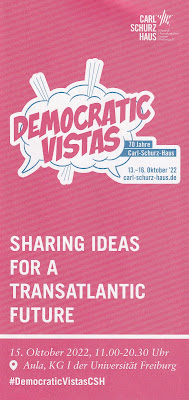Starting at 11 AM on Saturday, lectures and discussions filled the whole day until 8:30 PM in the evening. The number of talks and the many topics covered make it challenging to give a complete overview.
Instead, Red Baron picked out some details that turned him on, e.g., the German author Thomas Mann as a mentor of democracy?

|
| Kai Sina on Thomas Mann and Democracy |
*Part of the following text is drawn from the German Wikipedia
In 1918, this publication was followed by "Betrachtungen eines Unpolitischen
(Reflections of a non-politician)." Here, Thomas Mann tries to establish a
"Germanness" and to explain the German "Sonderweg" (particular path) in
terms of intellectual history and history, which according to him, is
incompatible with the democratic principles of France, England, and the
USA.
"In Germany's soul, the intellectual antagonisms of Europe are being fought out." The ideals of democracy and Western civilization cannot be asserted against the inner nature of Germany, for ... "free is the people only when one rules, not when many rule."
Mann emphasizes, "I profess and am deeply convinced ... that the much-maligned German 'Obrigkeitsstaat (authoritarian state)' is and remains the form of state appropriate to the German people, suitable to them and basically desired by them..."
Further below, he speaks of a future people's state, which is to be realized, beyond Western democracy and its connected capitalism and socialism, as it was about to develop in Russia.
"In Germany's soul, the intellectual antagonisms of Europe are being fought out." The ideals of democracy and Western civilization cannot be asserted against the inner nature of Germany, for ... "free is the people only when one rules, not when many rule."
Mann emphasizes, "I profess and am deeply convinced ... that the much-maligned German 'Obrigkeitsstaat (authoritarian state)' is and remains the form of state appropriate to the German people, suitable to them and basically desired by them..."
Further below, he speaks of a future people's state, which is to be realized, beyond Western democracy and its connected capitalism and socialism, as it was about to develop in Russia.
Are these last ideas already echoes of Mann's speech "Von deutscher Republik (Of German Republic)," which he delivered on October 13, 1922, on the occasion of Gerhart Hauptmann's 60th birthday?
In 1922, after dealing with the poetry of Novalis and Walt Whitman, Thomas Mann committed to the Weimar Republic. Is the content of the speech a break with the conservative-national "Betrachtungen eines Unpolitischen" of 1918?

|
| Had Mann changed from a Saul to a Paul? |
Thomas Mann declared that democracy - contrary to what its opponents claimed -
fits German culture and tradition better than Wilhelminism and "sentimental obscurantism." In particular, he said, the friendly and modest public demeanor of
Reichspräsident Friedrich Ebert convinced him that democracy was a more German
thing than "imperial gala opera."

|
| Democracy must be taught. |
Did Thomas Mann's avowal of the Republic correspond to an inner change of heart? Many interpreters believe that after more than 300 political murders in the past three years, he felt personal guilt for the widespread public silence in the face of "disgusting and inane murderous acts."
Following his emigration to the States in 1939, Franklin Delano Roosevelt
became Mann's hero, idol, and Obrigkeit.
In John Nichols' spirited lecture
What Carl Schurz and Walt Whitman Teach Us about Today's Struggle for
Democracy, we learned that the famous American democracy started as the assembly of
old wealthy white protestant men. The initial setup developed into democratic
structures that nevertheless still lack finalization.
An example is the Electoral College, where presidential candidates who haven't reached the majority of the popular votes are elected into office.
In the US, one senator represents 284,000 people in Wyoming to 18,671,000 in California.
A similar disproportion holds for Switzerland, where each Kanton has two Ständeräte in the "upper" house, while in Germany, each state sends at least three representatives into the Bundesrat. This number, however, is pondered, increasing to a maximum of six according to the population in a state.
As a pupil, Red Baron learned that Churchill once said about the British system of democracy, "It isn't one hundred percent democratic, but it works." So we have to live with imperfect democracies in the making.
An example is the Electoral College, where presidential candidates who haven't reached the majority of the popular votes are elected into office.
In the US, one senator represents 284,000 people in Wyoming to 18,671,000 in California.
A similar disproportion holds for Switzerland, where each Kanton has two Ständeräte in the "upper" house, while in Germany, each state sends at least three representatives into the Bundesrat. This number, however, is pondered, increasing to a maximum of six according to the population in a state.
As a pupil, Red Baron learned that Churchill once said about the British system of democracy, "It isn't one hundred percent democratic, but it works." So we have to live with imperfect democracies in the making.
The title of an impulse lecture by Mirrianne Mahn, city councilwoman of Frankfort, was
Representation, Democracy, and Women. What else? Her presentation
turned around abortion, comparing the situation in Germany to the States.
She did not look much at the progress already made but harped on
non-compliance and lack of (fast) progress in both countries.
Joshua Yaffa, journalist and foreign correspondent reported about A Continent at War: Russia, Ukraine, and the
West. Having lived in the war-torn region, he gave a complete overview of
the past and present situation.
Joshua Sellers, currently working at the American Academy in Berlin, drew in his lecture The Law of Democracy and Racial Equity a
somber picture of racial equality in the States concerning election-law
doctrines, electoral structures (including meandering), policies, and
practices.
It was nearly 5 PM, and Red Baron was tired.
But before I left, the lecturers and the organizing team met for a group
photo.
Well done, and thank you, Carl-Schurz-Haus.
*








No comments:
Post a Comment